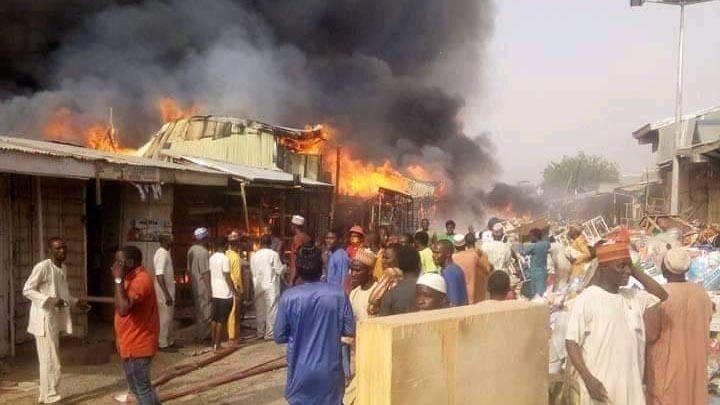A midnight fire outbreak on Sunday razed shops at Kano State’s largest foodstuff market, Singer Market. The fire raged till around 8am when firefighters, alongside the traders, worked to bring the situation under control and quench it from spreading to other areas of the market.
It was the third fire outbreak within two months in major markets in Kano State alone.
Penultimate Wednesday, goods worth millions of naira were destroyed in a fire incident that occurred at Akere Auto Spareparts Market, Ajegunle, in the Apapa area of Lagos State.
Similar fires were recorded in markets in Yobe, Katsina and other parts of the country. For example, on the night of February 25, 2023, fire burnt down the entire complex of Maiduguri’s Monday Market in Borno State. Established about 35 years ago as Maiduguri Monday Market Ltd, it is rated as the largest in North-East Nigeria and has continued to be the mainstay of the state’s economy.
Fire razes section of Onitsha main market
Use Ramadan to get paradise, not money, cleric urges marketers
The popular Tejuosho Market in Yaba was destroyed by fire. On November 6, 2019, just as traders were stock-piling wares in their shops for Christmas sales, a multistory building surrounding the popular Balogun market in Lagos was gutted by massive fire.
On January 12, 2018, no fewer than 100 shops, equipment and goods worth millions of naira were razed by an inferno at a section of the Sango Plank Market in Ibadan. The market had witnessed many such disasters in the past, with the last razing over 300 shops.
On October 17, 2019, fire disaster destroyed the Ochanja market in Onitsha, Anambra State, with the National Emergency Management Agency (NEMA) saying that about 2,000 traders were affected. About seven persons, including a nursing mother and her baby, were killed in the fire.
On November 19, 2018, over N10 million worth of goods too was consumed by fire at the Nkwo Ngwa Market fire in Aba.
In Kano, on February 6, 2019, the fire destroyed 70 shops in Yan’Katako Market in the Rijayar Lemo area of Kano. On June 10, 2019, fire gutted six shops in Kofar Ruwa Market (Kasuwar ‘Yan Rodi) in Kano. On April 14, 2019, the Kano State Fire Service said 35 temporary shops were destroyed by fire at Kurmin Yan-nama Market in Kano State. Again, on November 18, 2018, the Fire Service revealed that 77 shops were destroyed in Kano Market.
And on February 7, 2019, Fire Service said fire had destroyed 70 temporary shops at Yan’Katako Market in Rijayar Lemo area of Kano.
In Abuja, fire incidents were recorded repeatedly at the famous Kugbo market between 2013 to 2021. Fire incidents also occurred at Karimo market, consuming about 200 shops; at the popular Ebeano (July 17, 2021) and sprawling Next Cash & Carry supermarkets (December 26, 2021). In November 2021, another fire erupted at the Kubwa village market, claiming the lives of 10 persons, including a pregnant woman, and injuring several others. In the same November, fire razed a popular market at Nyanya.
Indeed, fire incidents have been disturbingly recurrent. And it has left in its wake destruction, with traders and families thrown into poverty as they labour from scratch to rebuild after each incident. There is hardly any state in the federation that has not experienced one market fire incident or another.
Business owners have been incurring losses due to fire incidents. No doubt, Nigeria’s economy and victims are bleeding financially from the damaging impact of market fires as each incident unleashes hardship on the victims, their families and other dependents.
What is worrisome is that market fires have continued to occur with no noticeable action to stop them. There seems to be no end in sight. These fire outbreaks across markets in the country are preventable if the government and traders would work together to implement preventive and acceptable measures.
For instance, the issue of power fluctuation would not be a problem if public power supply is efficient. There would also be no need for generators.
Moreover, there should be strict enforcement of all security measures, including police and other security patrols, observance of opening and closing time.
In addition, the traders, who conduct their businesses in the market, should be sensitised on the need to be fire conscious, including observance of no smoking protocol. Cooking by restaurants and bukkas should be closely monitored.
Also, the Fire Service Department must be part of the planning and building of any market. And no market should be approved or opened without a functional fire station.
All markets must have broad spaces for easy access of fire trucks and other emergency services’ vehicles.
Markets should be lightened up with solar powered lights to ensure proper visibility. And all market shop owners should be schooled on the need to switch off power and electrical appliances at the end of every market session or day.
Also, it is advised that all victims of fire incidents confirmed to have been caused by power surge or fluctuations should sue the power Distribution Companies (DISCOs). There must be consequences for dereliction of duties.
It is also time for all businesses, shop owners and even markets to embrace the culture of insuring their goods and businesses. All efforts must be made to stop these incidents.

 Join Daily Trust WhatsApp Community For Quick Access To News and Happenings Around You.
Join Daily Trust WhatsApp Community For Quick Access To News and Happenings Around You.